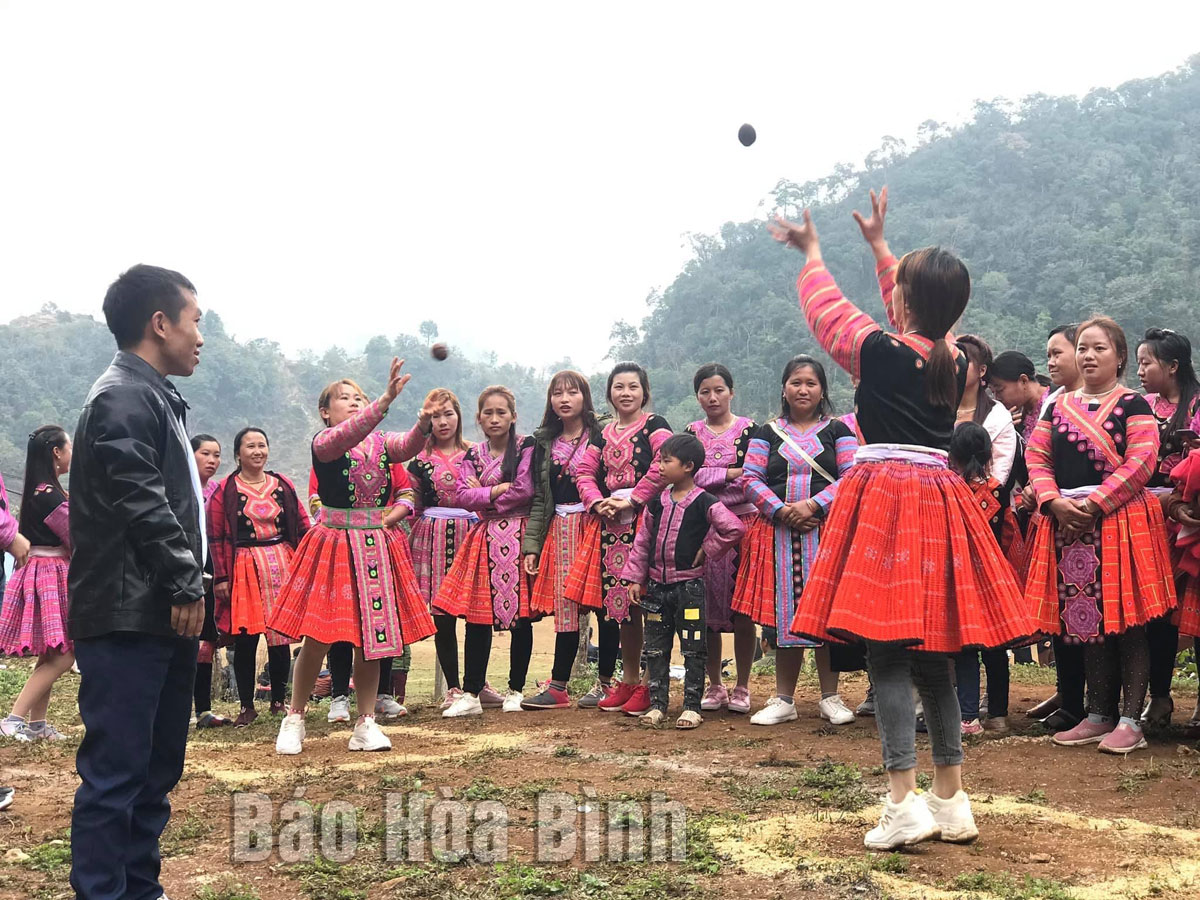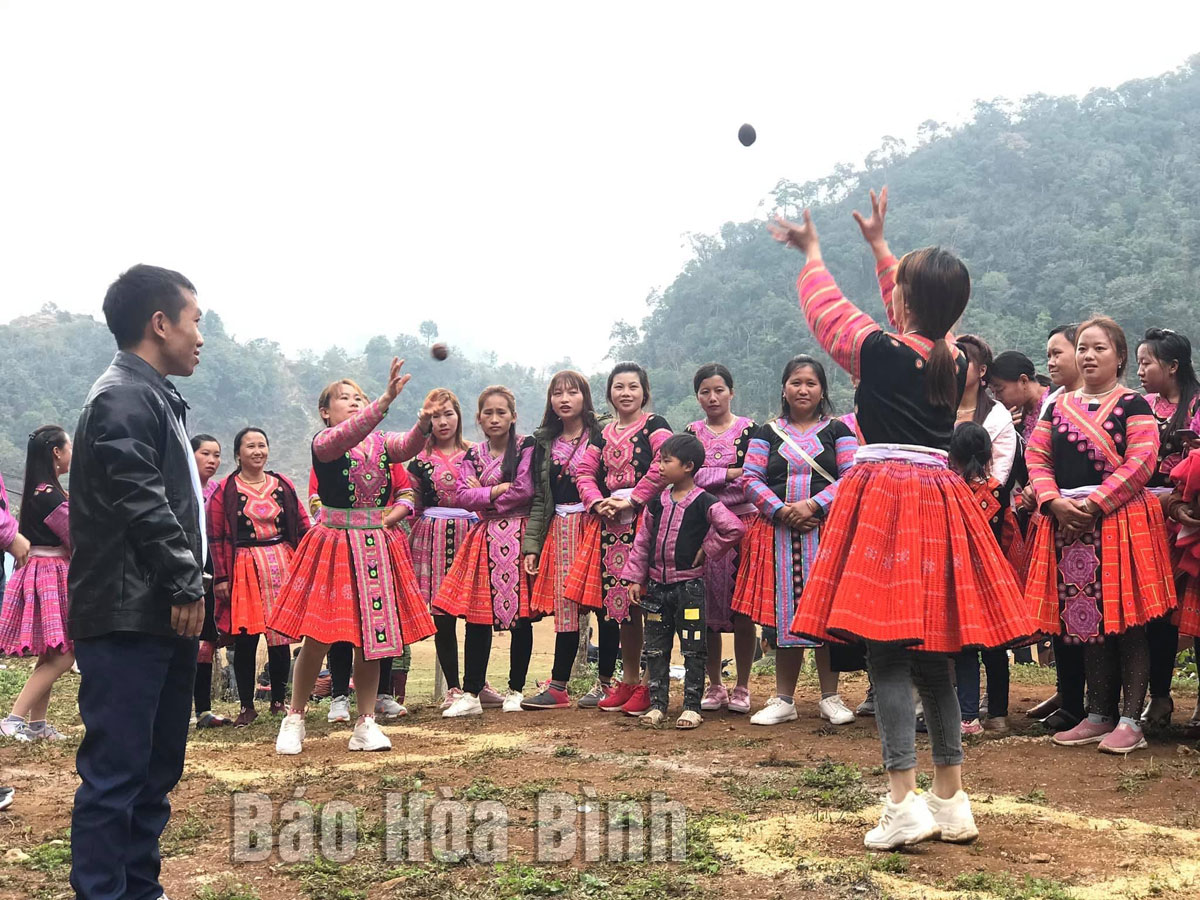
(HBO) – An interesting cultural relic of the Mong ethnic group in the northwestern region of Vietnam is that of the "ném pao” or ball throwing. It is not merely a folk game but represents much more to the ethnic traditions of the Mong. Nem Pao is a unique form of partnership and happiness that can lead to much more for ethnic Mong couples.

Mong ethnic women in Hang Kia commune,
Mai Chau district are throwing the ball (Nem Pao) on a spring day.
Images of Mong women busily sewing the last stiches on clothes and colourful
pao flow into the spotlight as visitors drop by the Hang Kia and Pa Co communes
in Mai Chau district. Colourful pao is made from linen cloth, stuffed with
flaxseed. According to Mong ethnic beliefs, the linen and flax balls are
colorful symbols of happiness and represent fertility and future partnership
within the community.
Pao making has been passed down through generations. Trumpet and khen (pan-pipe)
dances help men to find their partner, and pao are the equivalent symbol of
partnership for women.
A simple game, pao throwing carries great cultural value in that it allows men
and women to introduce and meet each other around the pao symbol of happiness.
The cultural phenomenon results in couples first meeting and transitioning into
becoming husbands and wives.
According to Sung Thi Mua, a local in Hang Kia hamlet, Hang Kia commune, it is
the Mong ethnics’ tradition that women should yield their paos in the spring to
start a season of fertility and partnership.
"We are passing down the making of pao and ball throwing festivities to younger
generations, and in doing so, perpetuate the Mong cultural traditions”, Mua
said.
Sung Y Mai, a brocade weaving artisan in Hang Kia commune, said Mong men want
to marry a woman who is good at weaving, embroidery and sewing pao.
"A good Mong woman must know how to make a good pao”, she said, explaining a
good pao must have tight stitches and it should be the perfect shape.
Nem
Pao is held at the yard of the local cultural houses or at the pitch, during
which two teams, each with three-to-ten men or women, throw the linen ball and
ensure it does not fall to the ground. While playing, women and men exchange
glances, smiles, and affection. After the game, if the woman and man feel the
love, the man will keep her pao and express his admiration on a subsequent
visit to her home. The goal, of course, is a lifelong partnership between them,
based on sewing skill and enjoying the cultural festivities together.
Nowadays,
life in Mong villages has changed drastically. The Mong people are paying due
attention to preserving their cultural values by integrating traditional games
into extra-curricular activities at the local schools.
According to Vang Y Sai, a teacher of Hang Kia Primary and Secondary School, in
a bid to preserve and develop folk games, the school carries out a wide range
of measures to encourage both students and parents to join folk games on regular
afternoons.
Together with ball throwing, other folk games like "đánh yến” (rooster feather
shuttlecocks), tu lu (traditional version of spinning tops), "đẩy gậy” (stick
pushing) and "ném còn” (còn throwing) have been well preserved by the Mong
ethnic in Mai Chau.
The games are not only a vivid illustration of Mong men’s strength and bravery
and the skillfulness of Mong women, but they also raise hope for a happy and
prosperous life./.
With an increasingly vibrant and widespread emulation movement aimed at building cultured residential areas and cultured families, Yen Thuy District has been making steady progress toward improving both the material and spiritual well-being of its people, while fostering a civilized, prosperous, beautiful, and progressive community.
Once lacking recreational spaces and community facilities, Residential Group 2 in Quynh Lam Ward (Hoa Binh City) has recently received attention for the construction of a new, spacious, and fully equipped cultural house. The project followed the model of state support combined with public contributions in both labor and funding.
The "All people unite to build cultural life" movement, which has been effectively integrated with Kim Boi district’s socio-economic development goals, is fostering a lively spirit of emulation across local residential areas, hamlets, villages, public agencies, and enterprises. In addition, through the initiative, traditional cultural values are being preserved and promoted, while community solidarity and mutual support in poverty reduction and economic development are being strengthened.
A working delegation of the Hoa Binh provincial People’s Committee led by its Permanent Vice Chairman Nguyen Van Toan on June 11 inspected the progress of a project to build the Mo Muong Cultural Heritage Conservation Space linked to tourism services in Hop Phong commune, Cao Phong district.
Born and growing in the heroic land of Muong Dong, Dinh Thi Kieu Dung, a resident in Bo town of Kim Boi district, in her childhood was nurtured by the sweet lullabies of her grandmother and mother. These melodies deeply imprinted on her soul, becoming an inseparable part of her love for her ethnic group's culture. For over 20 years, this love for her hometown has driven Dung to research, collect, and pass down the cultural values of the Muong people to future generations.
In the final days of May, the Ethnic Art Troupe of Hoa Binh Province organized performances to serve the people in remote, mountainous, and particularly disadvantaged areas within the province. These were not just ordinary artistic shows, but they were the meaningful journeys aimed at spreading cultural values, enhancing the spiritual life of the people and contributing to the preservation of ethnic minority cultural identities.



